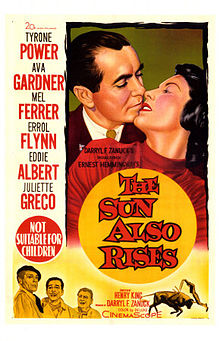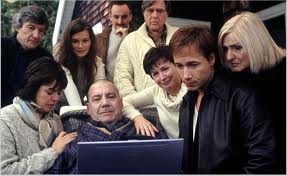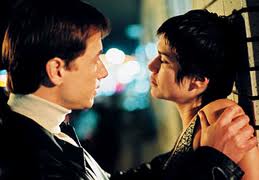 The Japanese title—“the sun rises again”—could be taken as a Japanese translation that signifies the renewed hope of, “Even though life is painful, tomorrow could be a wonderful day”; but actually, after World War I, there was a period of time when people had an emptiness that was hard to express, and the title captures the hopeless regard for daily life of, “Oh, today I also drank, ate, loved, and then it was over. Nothing new ever happens. The earth turns regardless of what I do, and tomorrow the sun will also again uneventfully rise…”
The Japanese title—“the sun rises again”—could be taken as a Japanese translation that signifies the renewed hope of, “Even though life is painful, tomorrow could be a wonderful day”; but actually, after World War I, there was a period of time when people had an emptiness that was hard to express, and the title captures the hopeless regard for daily life of, “Oh, today I also drank, ate, loved, and then it was over. Nothing new ever happens. The earth turns regardless of what I do, and tomorrow the sun will also again uneventfully rise…”
Hemingway, who lived out in the country in America, was not well understood by others regarding his wounded body and mind from World War I, so he planned to move to Italy, which had become his second home; but a friend advised him, “If you are going to Europe anyway, go to Paris, the center of culture,” so he found work as a correspondent and lived in Paris. There were many youths like him whose lives were changed by some sort of injury during the Great War. The Sun Also Rises is the story of the protagonist, who is a projection of Hemingway, sightseeing the bullfighting and festival in Pamplona, Spain with friends, and him being charmed by the beauty of the sport of bullfighting.
To be honest, this movie—other than the bullfighting scenes and the scene when the bulls are released into the streets—lacks charm entirely; I think the biggest problem, though, is that the lost youths in their 20s are performed by actors in their 40s. In the original, the protagonists are young, disappointed for some reason, don’t know what they should do, and live a life where their love affairs have become their “full-time jobs” (the only thing they have). In contrast, the actors performing them are successful in Hollywood, their pockets are packed with money, their faces clearly show an attitude of, “let’s enjoy dinner with family and friends after filming,” and they don’t look like they have any anxiety for their lives or futures. When well-aged actors play immature youth who are impulsively moved by their hormones and can’t stop themselves from falling in love, it is a disappointing movie that makes me want to say, “You should be old enough to know better than to do these stupid things.”
There is no author that represents the merits of America as much as Hemingway. He was born in Illinois, which symbolizes the heart of America as well as honesty, faithfulness, and diligence. If I list politicians from Illinois—Abraham Lincoln, Hillary Clinton, and President Obama—you will understand the values held by Illinoisans. Hemingway was a handsome man and had a strong sense of justice, and he established a literary style that expressed his feelings in simple English that anyone could understand. He had a healthy body, and liked sports, particularly hunting, fishing, and boxing. He was an athletic man, but also had a mind capable of understanding anything from a delicate heart to a decadent lifestyle.
His experience in World War I determined his view on life. Like how the Vietnam War impacted a generation in America, his most influential experiences started and ended with World War I. The later World War II did not have as much of an impact on him as World War I did. This is because World War I occurred during his late teens, when he could best understand war and was impressionable. To America, Hemingway was an author that symbolized the “good ol’ America” from before the 1950s.
While watching American movies, I noticed movies from before the 1950s and after the 1970s are totally different. Movies before the 1950s seem to be tall tales performed by elementary school children, and there is nothing relatable in them today. In contrast, with movies made after the 1970s –if you look at movies such as The Godfather or The Deer Hunter today—there is something relevant in them today, and the themes surprisingly don’t become old. During the 1960s that bridged the 1950s and 1970, events such as the assassinations of President Kennedy and Martin Luther King Jr., the intensification of the Vietnam War, and the Watergate scandal occurred. After this, America was no longer the same. Hemingway committed suicide in 1961, which seems to symbolize the end of “good ol’ America.” Even if he had lived on, I don’t think Hemingway, having experienced World War I, would have been deeply impacted by the Vietnam War.
Bullfighting, which Hemingway loved above all else, was once the national sport of Spain, but due to animal rights arguments against killing bulls, the popularity of bullfighting has begun to decline. The first law banning bullfighting came into existence in the Canary Islands in 1991; in July 2010, Catalonia—which had a strong anti-Madrid feeling—established its first ban against bullfighting, and Catalonia had its final bullfighting show in 2011. Seventy-five percent of citizens in Spain say they are not interested in bullfighting, and now Spaniards are crazy about soccer. Once, a circus went around the countryside with a lion and an elephant, delighting people who had never seen these animals in real life, but due to opposition from the animal protection movement, this began to decline; in 2011, the last circus elephant in Great Britain was retired and transferred to an African safari park as its new home, making the news headlines. In 2012, it was widely reported that Juan Carlos I, the King of Spain, unofficially went to Botswana and hunted lions, despite the fact the King himself worked as the honorary president of the World Wide Fund for Nature; he received international criticism for hunting animals and was dismissed from his position as honorary president of the Fund. Currently, the most popular sports in the world are soccer, basketball, tennis, and track-and-field events, while the interest in boxing and hunting seem to be decreasing. The sun always rises the same way every day, but the times change.

 Director Denys Arcand, who made
Director Denys Arcand, who made 
